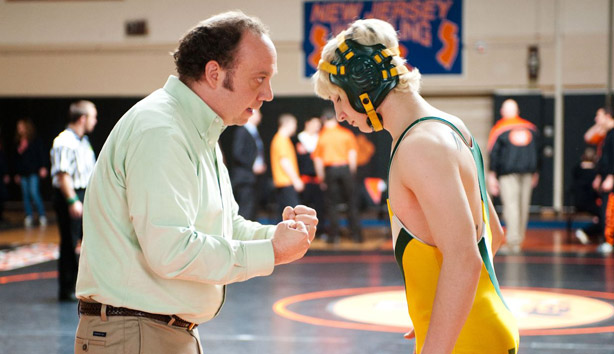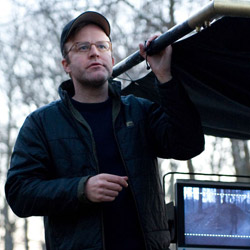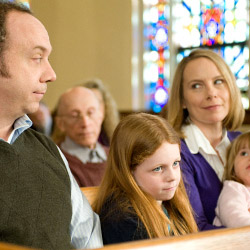Web Feature Posted April 27, 2011
There’s Something About Ordinariness:
A Conversation With Win Win Director Tom McCarthy
By Jeffrey Overstreet (jeffreyo@spu.edu)

Photo Courtesy of Kimberly Wright TM and © 2010 Twentieth Century Fox Film Corporation
The multiplex is shaking. Explosions rumble from theatres where moviegoers behold the latest alien invasion, zombie apocalypse, or animated amusement park ride.
But if you listen, you’ll hear laughter and cheers coming from another theater — the one at the end of the hall, where a rather unlikely big-screen contender is winning more and more fans.
Win Win is about people and situations that most film studios would have tossed in the trash. It’s about a New Jersey elder-law attorney who makes an unethical decision while representing a troubled old man in court. Doesn’t sound like the kind of movie you’d want to see on a Friday night, right?
But you’ll be glad you did.
Win Win is a laugh-out-loud comedy, starring Paul Giamatti and Amy Ryan as Mike and Jackie Flaherty. The Flahertys already have two children, but Mike’s courtroom mistake brings a newcomer to their household — a young wrestling champion named Kyle who needs some parental guidance. Played by a spirited newcomer named Alex Shaffer (who really is a nationally ranked high school wrestling champion from New Jersey), Kyle is like a lost and injured puppy who needs care. But Mike, who coaches young wrestlers in his off hours, sees something different in Kyle — a chance to help his team win matches.
Win Win comes from the imagination of Tom McCarthy, the writer and director who made The Station Agent and The Visitor, two more unlikely audience favorites. McCarthy’s concern for character development and storytelling is far greater than his concern for action and explosions. He’s such a great storyteller that the filmmakers at Pixar called him in to work as a co-writer on Up.
When McCarthy visited Seattle recently, he spoke with Response about the movie and why it’s winning cheers.
 Tom McCarthy, Photo Courtesy of Kimberly Wright TM and © 2010 Twentieth Century Fox Film Corporation
Tom McCarthy, Photo Courtesy of Kimberly Wright TM and © 2010 Twentieth Century Fox Film Corporation
Your characters are such unlikely heroes. Finn in The Station Agent, Walter in The Visitor, and now Mike the elder-law attorney in Win Win. What draws you to these characters who don’t seem like spotlight material?
Tom McCathy: There’s something about ordinariness that I’m fascinated by, and how it can become more than that, how it can eke its way toward extraordinary.
Depending on the character and the moment, I think we are all capable of those moments of extraordinariness whatever the stakes may be in our lives.
Sometimes I shoot myself for not creating a canvas that’s more extreme, where there’s a broader range of color. But sometimes I lock in on the humanity of a certain character in a certain world and I become excited about exploring that and trying to remain as true to it as possible.
With this particular story, it was very challenging. The Station Agent was about a dwarf living in a train depot. With The Visitor I had New York, and this multicultural backdrop. But Win Win is set against this very conventional background. I was dealing with a pretty conventional family, something that I think a lot of people could relate to or see themselves in. The question was how to find a storyline there that would remain true to the world, but was still compelling.
Your leading characters are always very conflicted, too. And Mike makes a decision in Win Win that’s downright criminal.
Mike’s a lawyer. He runs a business. But he cares about his clients. He chose elder law, in my mind, because the elderly are very vulnerable members of our society. I think all his intentions are quite good, but he makes a bad choice.
To me, it’s compelling when you talk about decent people who are trying hard to do the right thing for the right reasons — for their families, for the community — and they make some really bad choices in the name of that.
The ends don’t justify the means. Even if you’re doing it for your family, for your kids, for the future, you still can’t make the wrong choice. You still have to be held accountable.
That’s something we’ve been dealing with on a macro level, certainly on Wall Street. I wanted to explore that on Main Street the way some of our great playwrights, like Arthur Miller and August Strindberg, have done. They have a way of distilling these stories about people being compromised.
Mike’s compromised himself. As a result, he can’t stand up. Terry says, “You’re a pillar of the community.” His wife says, “You’d win in court.” But he knows he can’t. His integrity has been compromised. It’s so simple, but it’s what lies at the heart of a lot of the problems we’re in right now, I believe.
In your films, faith seems to be an important element. We see Joe in The Station Agent bring broken people together by asking them to join hands in prayer before a meal. In Win Win, the Flahertys are faithful churchgoers. And the film begins with the image of an angel in a window. Why do you bring faith into your films?
I grew up Irish Catholic in a New Jersey community. We went to church all the time.
I remember sitting there, and that offering basket coming by, and thinking, “I wonder if I could take money out of that basket?” And in Win Win, a kid does that! That was really weird, because it wasn’t staged. It was just so perfect.
And it’s what Mike does in the movie: “There’s money on the table, why not take it? Who’s going to know?”
In terms of spirituality, there’s a lot there. That angel is a precursor to Kyle dropping into the Flahertys’ lives.
That scene where Mike is wrestling with Alex on the front lawn, which is traumatic and funny, is also a man literally wrestling with his own sense of right and wrong. It’s similar to Jacob wrestling with the angel, and what that means. That is there. The wing tattoos on Kyle’s back, and the color of his hair — there’s certainly a theme there.
That said, there’s also a routine to going to church which I remember well. It wasn’t always a spiritual thing. Sometimes it was just part of your routine. It was like saying, “I’m a good person. This is what I do.”
At times, that spirituality would be more active, it would mean something, it would be something you’d leaned on relied on, or sought strength from. At other times it would just be something you were doing as part of your routine.
 The Flahertys, Photo Courtesy of Kimberly Wright TM and © 2010 Twentieth Century Fox Film Corporation
The Flahertys, Photo Courtesy of Kimberly Wright TM and © 2010 Twentieth Century Fox Film Corporation
So for Mike, maybe it’s just part of the routine.
And then, after church you see him chatting up the old guys, and you realize that for him there’s always that little bit of business out front. Whenever he’s talking to old people, whether it’s at the Dunkin Donuts or the church parking lot, they’re clients — future or present.
Do you think much about the audience as you write?
I’m not so much concerned with the audience perception when I’m writing. I’m more concerned about the organic development of the story, so I’m trying as hard as I can not to imagine an audience’s perception.
Ultimately, art aspires to entertain at some level. And with filmmaking being such an expensive art form, you need to keep that in mind, or you won’t be making movies for very long. That said, when I’m creating the stories and the characters — even working in a conventional world, like with Win Win, which is set in a New Jersey suburb — I’m trying to remain as true as I can to that world. I’m concerned about the journey of the characters.
Sometimes I finish a draft and I stand back and I try to look at it with an audience’s eye and ask, “How are they experiencing this?” But I try not to approach it like it’s a product, or something that has to be sold to market. Rather, my feeling is that if the story is well told, and if the characters are authentic to themselves and to that world, whatever that means, you will grab that audience and they will go on the ride.
So, I never go into a story thinking, “What’s going to grab them?” I’m really thinking about the story, and I really try not to take my head out of that ‘happy sand’ until the story is complete.
You’ve done a lot of acting too, and as very different kinds of characters — from HBO’s "The Wire" to movies like Duplicity and Little Fockers. When you’re acting, do you feel that same tension, that conflict between entertainment and art?
As an actor, you can be blissfully free of that responsibility. You’re a part of a machine. You’re looking for a good story, good material, and a good character. And whether it’s a lead role, or the 10th or 20th character on the call sheet, your job is to go in there and realize that character as authentically as possible.
If you’re reaching for something outside of the character, how that character may be perceived by others, you’re acting in bad faith. We see that in everyday life — people who go around worrying about how they’re being perceived, rather than what they’re doing. We call those people “posers.” We have a lot of names for those people.
What makes Paul Giamatti so compelling as an actor, especially in a movie like Win Win, is that he’s really quite restrained. He’s so focused on realizing the potential and the limitations of that character and exposing them. That’s all he’s concerned about. There’s something incredibly compelling to watch in that. He’s never caring much about others’ perception. He’s much more concerned about realizing the character.
Most movies make it clear who the “bad guys” are, and audiences enjoy rooting against them. But in all three of your films, you’ve treated all of your characters with a lot of respect. No matter what part they play in the conflict, you take the time to consider how they see the world. Nobody ever becomes a scapegoat. Is that a deliberate storytelling strategy for you?
I must admit, I’ve never had a pure villain in any of my movies.
And jumping over to my acting roles, even in "The Wire," where you could say that I was playing one of the worst villains in all five seasons of that show — and I certainly get a lot of that on the street! I remember talking with David Simon about this, and saying, “This guy’s not a bad guy. He’s ambitious. He’s got designs on greater things. He’s got goals. He’s got things he wants to achieve.”
It’s about trying to give those characters motivations. Villains aren’t usually born to be villainous. It’s usually some aspect of their human nature which runs amok or overrides many their other sensibilities.
That’s something I’m always interested in exploring. It makes storytelling a bit more different, and possibly more subtle. But it can be equally compelling and, in many cases, truer to life.
"The Wire" gave us a great example of how complicated heroes can be too. Anyone in that series who did anything heroic would usually turn around and do something else that would complicate the picture and compromise their integrity.
And how true to life is that?
Just look at the cast of heroes and characters in the entertainment, sports, and political realms. Again and again, that’s what we see. It’s human nature.
It made so much sense that Pixar would invite you into the storytelling process of Up. They’re so patient in their storytelling, and they create such memorable characters. What do you think they know that makes their movies so superior to other “family entertainment” in the theatres?
Their main concern is story. That’s all they care about: story, story, story. They know that they’re good enough to take care of everything else. So they spend a lot of time on it.
They do have villains. They need villains. They reach a broad audience and a young audience, and it helps to have that. That’s something they’ve come to understand and deal with, and they deal with it very well. In any story, if you are complete and honest in telling that story, it’s going to yield good things.
They’re a purely creative team. Everybody you’re answering to up the flagpole are writer and directors. It’s a utopian society they’ve built there. It’s great to watch.
In a way, Win Win reminds me of the recent Oscar-nominated film The Kids Are All Right. Both films consider the question “What is a family?” Both of them make us ask whether family is about who raises us and takes responsibility for us, or if it’s the people to whom we have a biological connection. The Kids Are All Right seemed to favor those who take responsibility, and Win Win does too. But your film also makes it very clear that those biological connections are very important, and to be respected.
That’s something I was very interested in. It’s something we’re all constantly wrestling with and redefining.
Whenever you’re dealing with a story like this that is intergenerational, you can’t help but visit those themes. Fortunately, they can’t help but inform the story and enrich it in some way that speaks to all of our lives. It’s something we all deal with, and we all have the benefit of to some degree.
Specifically with Win Win, it was something I was excited to explore.
You have such a strong sense of storytelling, I wonder, do you have any storytelling pet peeves that bother you at the movies?
In some ways, I’m an easy audience. If I feel like the story is holding together, I’m fine. I think almost the most difficult thing for any filmmaker is getting the tone right.
There are certain topics or worlds I don’t need to see again. I don’t ever need to see another movie about Las Vegas. I don’t need to see another movie about an Elvis impersonator. But then somebody will make a great movie and prove me wrong.
I’m not a fan of really broad comedy or slapstick. I’ll laugh for a while, but then I’ll lose interest because there’s no connection to reality.
If I believe in the characters, a story will get me hooked.
You mentioned you grew up Irish Catholic. Is that still a daily practice for you, or is that more of a cultural background detail for you?
It’s not a daily practice. It’s probably more of a cultural thing at this point in my life. But it’s something I’m still very connected to, and it’s evidenced in all of my films.
As a writer, it’s wonderful when you can depict bits of your personal life on the screen, whether you know it or not while you’re writing.
Faith is a fascinating thing to explore, especially with characters. Some have more, some have less. Some do it out of habit, some do it out of a deep need. That, to me, is interesting.
Congratulations on getting Win Win into theatres. Audiences obviously love it.
I’m kind of shocked we made this movie. A lot of people have asked me, “How do you make these films in this climate? They’re so difficult to make.”
I was talking with Searchlight. And they were thrilled with how Win Win did opening weekend, and with the critical response. They were saying, “There aren’t many movies like this out there anymore, in part because of the economy. People can’t afford to make movies like this. It’s a gamble.”
Luckily you’ve got studios like Searchlight who are willing to gamble on movies like that, and gamble on me and the team we put together.
Have you seen Win Win? Tell us what you thought.
Posted Saturday, June 18, 2011, at 5:29 p.m.
I was wrestling in Hunterdon county, New Jersey, back in the mid '70s and seeing the homeboy champ on screen and hearing an interview on NPR's Freash Air about him was special for me. I am also not drawn to the mainstream storyline when it comes to films so you can imagine how refreshing it was to settle in to the story being told about the lives of the people in the film. Tom McCarthy is a name I will remember and whatch for in the future.
Dadin Westchester
Posted April 29, 2011, at 12 p.m.
What a warm and caring film. It is a feel good film from the beginning to end. Casting has to be congratulated for picking the perfect group to fill in every bit of character there is in the story. From established actors to first timers. Alex and David did a wonderful job and I hope they continue their acting careers.
Sarah Zarr
Posted April 28, 2011, at 5:06 p.m.
I loved the movie, as I've loved all of McCarthy's movies, and he's one of my mentors (in my head, anyway). As a writer, I, too, am so interested in the extra-ordinariness in the everyday, and the small stories that make up most of our lives. And yes, seems like a not-so-minor miracle that movies like this still get made and distributed. Thank God! Great interview.
